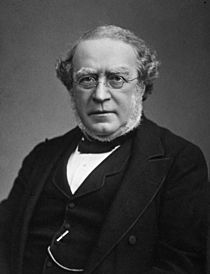Alfred Baring Garrod facts for kids
Quick facts for kids
Alfred Baring Garrod
|
|
|---|---|

Alfred Baring Garrod
|
|
| Born | 3 May 1819 |
| Died | 28 December 1907 (aged 88) |
| Nationality | English |
| Alma mater | Ipswich Hospital |
| Known for | uric acid associated with gout |
| Scientific career | |
| Institutions | University College Hospital |
Sir Alfred Baring Garrod (born May 3, 1819 – died December 28, 1907) was an important English doctor. He is best known for his discoveries about a painful joint condition called gout. He found a link between gout and a substance in the blood called uric acid.
Contents
Early Life and Education
Alfred Baring Garrod was born in Ipswich, England. His parents were Robert and Sarah Garrod. He began his medical training at Ipswich Hospital. Later, he moved to University College Hospital in London. He earned his medical degree there in 1843.
After finishing his studies, he worked at different hospitals. He was an assistant at West London Hospital. He also worked as a doctor at the Aldersgate Dispensary. In 1849, he became a full doctor at University College Hospital.
Important Discoveries
In 1848, Dr. Garrod made a big discovery. He found that people with gout had too much uric acid in their blood. Gout is a type of arthritis that causes sudden, severe pain and swelling in joints. It often affects the big toe.
Garrod was the first to suggest that a medicine called lithium could help treat gout. He also thought that gout might be connected to mood problems. He believed it could cause conditions like mania and depression.
He is also famous for creating the name "rheumatoid arthritis". This is another common type of arthritis. It causes pain, swelling, and stiffness in many joints.
Career and Recognition
In 1863, Dr. Garrod became a professor at King's College Hospital. He taught about materia medica (the study of medicines) and therapeutics (the science of healing). In 1874, he left the hospital but continued as an honorary consultant.
His work was highly respected. In 1857, he gave important talks called the Goulstonian Lectures. These were for the Royal College of Physicians. In 1858, he was chosen as a Fellow of the Royal Society. This is a very high honor for scientists.
In 1860, he became the president of the Medical Society of London. He gave more important lectures in 1883. In 1887, he was knighted by the Queen. This meant he was given the title "Sir Alfred Baring Garrod." In 1890, he became a special doctor to Queen Victoria.
Family Life
Sir Alfred Baring Garrod married Elizabeth Ann Colchester. They had six children together. Two of his sons also became well-known. His son Alfred Henry Garrod was a zoologist, who studied animals. His other son, Archibald Edward Garrod, also became a famous doctor.
Sir Alfred Baring Garrod passed away in 1907. He was buried in the Great Northern cemetery in Southgate, Middlesex.
Selected Writings
Sir Alfred Baring Garrod wrote several important books and papers. These helped other doctors learn about gout and related conditions. Some of his notable works include:
- "Observations on the blood and urine of gout, rheumatism and Bright's disease" (1848)
- "The nature and treatment of gout and rheumatic gout" (1859)
- "A treatise on gout and rheumatic gout (rheumatoid arthritis)" (1876)
 | Aaron Henry |
 | T. R. M. Howard |
 | Jesse Jackson |

